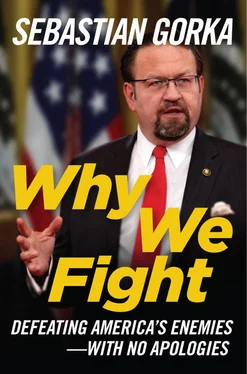Sebastian Gorka:I see myself as an optimist, but you’re giving me a real challenge with that last one. So for months and months and months, I refused to use the phrase “Deep State.” I really thought that was a tinfoil-hatty kind of thing.
Dave:For the record, I don’t even know that I’ve ever said it once on this show. It sort of pops up in ancillary ways.
Sebastian Gorka:But, Dave, I use it now because I’ve seen it.
I’ve seen it inside the administration. When you go to enough National Security Council meetings that are classified, that is the pinnacle of policy-making in America outside of the Oval Office. I mean this is where policy is made. Everybody in the room is from the NSC. Then you’ve got the outstations on secure video teleconference from the Defense Intelligence Agency, the chairman of the Joint Chiefs, the CIA, State, you name it, and you sit there as a newly appointed political, and you listen for two hours on a big issue—ISIS, Russia, whatever it is—and not one participant mentions the name of the president or what he said yesterday in Warsaw, or what his objective is given that specific issue. And you see this happen again and again and again, and you’re the guy at the end of the conversation with a funny accent who says, “Excuse me, ladies and gentlemen, you do know what the president said about x yesterday. Can we actually do that?”
The Deep State is real. When you’ve got GS-15s and SESs [Senior Executive Service] saying, “I’ve been here for twenty years. This guy’s going to be here for four. I know better.” That’s bad for democracy.
Dave:So to be clear. You don’t think it’s some kind of massive underground conspiracy. You think it’s just the apparatus. It’s just the old Washington apparatus.
Sebastian Gorka:You know these people who think Obama is sitting in a cave somewhere with a joystick? No. He’s lazy. He’d never be a mastermind. It’s not SPECTRE and he’s not Blofeld.
No, but there’s a culture in government that’s antithetical to, and undermining, the president on a daily basis. But there is concerted effort in the media. Oh my gosh! I mean Ben Rhodes brags about it. When he says, “My buddies the left-wing journalists are morons, and they’re my echo chamber.” He built this machine that was this incestuous connection between people in the West Wing, people in the think-tank community, and their buddies in the media. Just look at the attack pieces on anybody, me, or whatever. It’s very interesting. Somebody should do a case study in journalism school. One attack piece will drop at seven am. By two o’clock in the afternoon, thirty have been written, which were simply cut and paste, but if you don’t know that, it looks that “Oh my gosh, Gorka’s a fascist.” But it’s one guy’s article that was written because Ben Rhodes told him to write it that comes and gets multiplied.
On the right, how do we react? “Well, I got my op-ed into National Review this month.” There’s a gulf in terms of managing narrative. The left built a whole ecosystem, and we’re still in the 1980s, you know. We say, “Oh, we’ll take out a full-page ad in the Washington Times .” [It’s just not enough].
Dave:I think most people, because of the way social media works, they immediately go to the full-on conspiracy of Obama with a joystick or just some other version of the globalist thing, whereas what you just described is more realistic to me—that there’s an apparatus there that is still connected to the media. We can discuss that in a sensible way.
Sebastian Gorka:With one addition, and I appreciate this, being in the crosshairs for so long. They have an advantage because our side is predicated on what, Dave? On the individual, on manifest destiny, rugged individualism. We believe in the individual. The left by definition is a collective entity. There are elements of the Borg in the left. It is truly a collective mob mentality. When one guy goes after Gorka or Bannon or whomever, after the president, there’s a massive, collective pile-on. It’s not a conspiracy, but they’re all singing from the same hymnal. They don’t need direction, but they say, “Oh yeah, let’s go after him.” Which puts us on the right at a disadvantage.
Dave:So this is just sort of an emergent group thing.
Sebastian Gorka:It’s a cultural thing.
Dave:Wow, we’re going to do this again.
Sebastian Gorka:I hope so. This was so much fun!
Dave: It’s been an absolute pleasure. For more on Dr. Gorka—you know you really should be a Star Wars character!—for more on Sebastian, follow him on Twitter, it’s @SebGorka.
AFTERWORD
From West London to the West Wing
The last two years have been quite a ride.
Why We Fight was written before I moved into the White House, but I feel I owe you, dear reader, a few words on how I became strategist to the president of the United States.
If anyone had said to me twenty years ago, or ten or five years ago, that this British-born immigrant to the United States would be walking around the West Wing of the White House as a deputy to the president, I would have thought him clinically insane—but there it was. A reality TV star who had never held public office became our commander in chief, and a legal immigrant with a funny accent became one of his political appointees. Only in America.
Truth be told, I always loved America. I may have been born and raised in West London to refugees from communist Hungary, but something about the States pulled me like a magnet. From my childhood, watching reruns of TV classics such as Kojak , Starsky and Hutch , and The Streets of San Francisco on British TV, to my student days at the University of London, buying a beat up ’76 Chevy Camaro, something about the brash, no-excuses attitude of Americans simply resonated with me.
My parents were Hungarian, and my formative years were shaped by their experiences and the stories they told me about life in war-torn Budapest and then under the oppression of communist dictatorship. But during the Cold War years, this family history strengthened my attachment to all things American. It was clear to me that it would take US leadership and might to win that conflict against the new totalitarians, just as it had against the Nazis and fascists before.
When the Berlin Wall fell and the West won that ideological war, it was natural for me to take that heritage and try to live it. So, at the ripe age of twenty-three, I moved to the land of my forefathers, the newly free Hungarian Republic. My idealistic goal was to help the country my parents had fled rebuild itself as a functioning Western nation, to assist where possible in its re-entry into the community of Western nations. With the English, French, and German languages under my belt, the rudimentary Hungarian I had learnt at home, and the experience of a stint in the British Army reserves, I got a job in the Ministry of Defense (MoD) of the first post-communist government of Hungary.
Those five years in the MoD deserve a book themselves. For a young man who had grown up in Margaret Thatcher’s Britain, going to live and work in a nation suppressed by forty years of communism was akin to beaming down from the Starship Enterprise onto some unknown planet—and without Spock to assist me. But that’s another story. During those years, I met my muse and my eternal partner, Katie, at an international conference on ethnic conflict held in Romania, of all places. She had flown in from her think tank job in New York, and I from the MoD in Budapest.
Читать дальше












